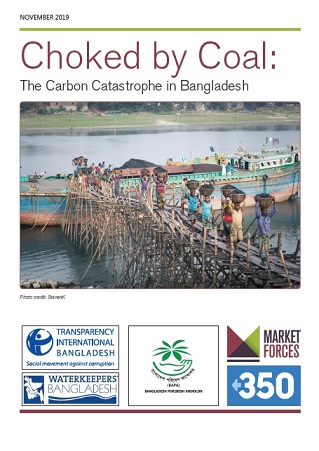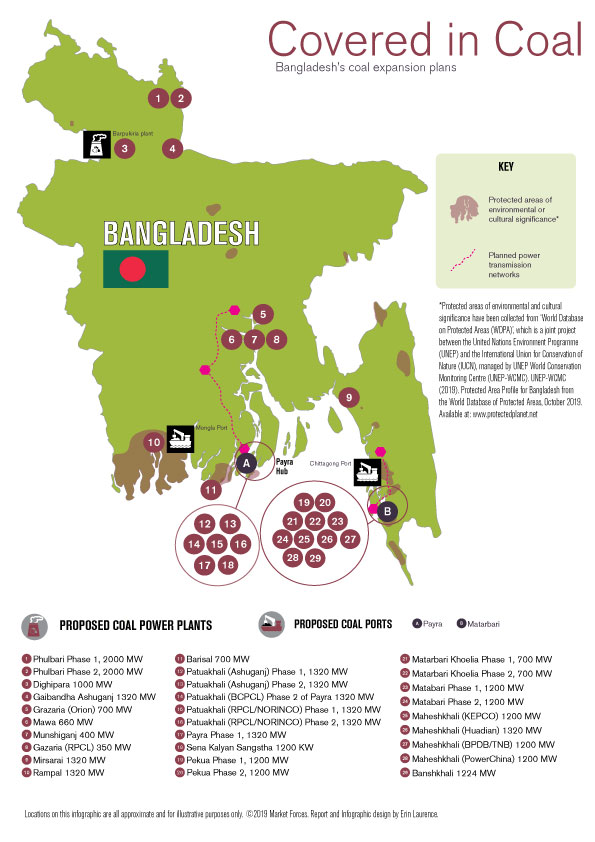Choked by Coal: the Carbon Catastrophe in Bangladesh
New analysis shows China, UK and Japan driving 63-fold coal power expansion in Bangladesh
Media Release: 6 November 2019
Massive coal-based power expansion in Bangladesh is set to propel it into the ranks of the world’s worst polluters, says a major new report out today. The expansion not only threatens global climate targets but promises to further aggravate catastrophic environmental insecurity within a country where floods, cyclones, droughts and pollution have already taken thousands of lives.

‘Choked by Coal: the Carbon Catastrophe in Bangladesh’, published by Market Forces and 350.org, and co-published by Bangladesh Poribesh Andolan (BAPA), Transparency International Bangladesh (TIB) and Waterkeepers Bangladesh exposes foreign-led finance as the driving force behind plans for 29 coal-fired power stations, an expansion that has seen Bangladesh leap, within just 3 years, from 12th to 6th in terms of global coal power under development. If built, these plants would increase the country’s existing coal capacity 63-fold, from 525MW today to 33,200MW.
Groups within Bangladesh are outraged.
“Building polluting and out-dated coal-fired power stations when the rest of the world is switching to renewables is a colossal act of self-sabotage,” said Bangladesh Poribesh Andolon (BAPA).
“UNICEF has already linked climate change to devastating floods, cyclones and other environmental disasters threatening the lives and futures of more than 19 million children in Bangladesh,” said Dr. Abdul Matin, General Secretary of BAPA. “The proposed coal expansion will see this country being led further down a devastating path.”
As of August 2019, Bangladesh’s installed power capacity was 19,000 megawatts (MW), only 3% of which is coal-fired. 90% of the country’s population currently benefits from electricity coverage.
Chinese banks and companies are leading the dirty energy drive, funding over half the projects. UK and Japan-based companies are involved in three proposed coal projects each, despite transitioning to cleaner energy within their own borders. The UK, for instance, plans to phase out coal power by 2025.
“It seems the financial institutions and governments of China, Japan, India and the UK are more interested in squeezing a final dollar out of the dying coal industry than they are of the devastating consequences for both Bangladesh and the global climate.”
Market Forces
“There is simply no way to square coal expansion with commitments to limit global warming to 1.5°C. The countries and financial institutions financing Bangladesh’s coal boom are blatantly flouting their promises to achieve the Paris Agreement’s climate goals.”
350.org said “While many nations across the globe increasingly realize the importance of phasing out from fossil fuels, coal companies supported by major financial institutions want to lock Bangladesh into dirty, dangerous and expensive fossil fuel infrastructure. Bangladesh is already one of the countries most affected by climate change, and cannot become the dumping ground for coal due to vested corporate and political interests. The long-term costs of this obsolete technology to the local communities will pile up for decades. A strong people’s movement has already proposed an alternative plan to generate 55% of electricity from renewable energy sources by 2041, which is a crucial tool to a transition towards a sustainable, fair and accessible new energy system.”
According to the report, a clean and sustainable energy future is possible for Bangladesh. Only 10% of the proposed coal plants have progressed to the construction phase, while the remaining projects have merely been announced or are in preliminary, pre-construction stages. Potential for up to 53 GW of solar power capacity exists within the country, which could replace planned coal power projects as a lower cost alternative for electricity generation.

“Bangladesh is a fast-growing country which needs power, but that does not have to come at the expense of the lives and livelihoods of millions,” said Waterkeepers Bangladesh. “Across the border and in many countries around the world, renewable energy is already cheaper than coal. Bangladesh has already demonstrated commendable use of solar energy for domestic and other small-scale consumption, and has the opportunity at this critical juncture to follow the same path, but to do so, it’s imperative for foreign investors to clean up their dirty money.”
“We also call upon the authorities to develop and implement a specifically time-bound strategic plan to effectively comply with national and international commitment to move to renewable energy. To meet its energy demands, Bangladesh does not need to transform itself from a most adversely affected country by climate change to one responsible for climate change”.
“We call upon the Government to freeze all the under-construction coal-based power projects until such time as independent, robust, credible and internationally acceptable environmental impact assessment of each project is separately conducted by expert entities without any conflict of interest,” said Dr. Iftekharuzzaman, Executive Director of TIB.
Download the Full Report and Report Summary [PDFs].
Contact: Kuntal Roy, Bangladesh Communications Associate Global Strategic Communications Council [email protected] or +880 1716 421664
Stay updated on our campaigns
Photo credit: StevenK, Bangladesh.
